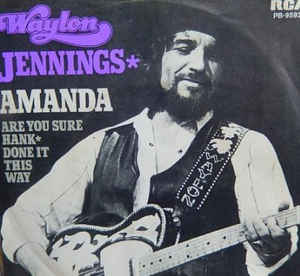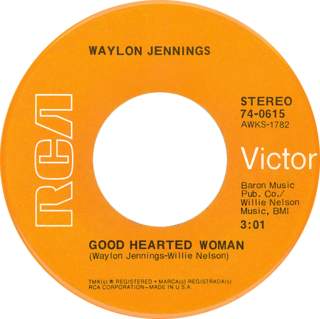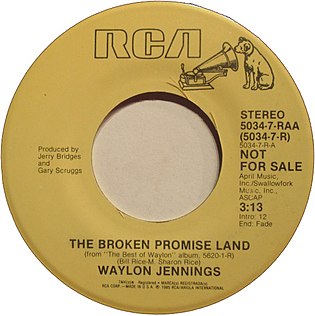Related Research Articles
"Mammas Don't Let Your Babies Grow Up to Be Cowboys" is a country music song first recorded by Ed Bruce, written by him and his wife Patsy Bruce. His version of the song appears on his 1976 self-titled album for United Artists Records. In late 1975 and early 1976, Bruce's rendition of the song went to number 15 on the Hot Country Singles charts. This song was featured on Chris LeDoux's album released January 20, 1976, Songbook of the American West.

Mark Nelson Chesnutt is an American country music singer and songwriter. Between 1990 and 1999, he had his greatest chart success recording for Universal Music Group Nashville's MCA and Decca branches, with a total of eight albums between those two labels. During this timespan, Chesnutt also charted twenty top-ten hits on the Billboard Hot Country Songs charts, of which eight reached number one: "Brother Jukebox", "I'll Think of Something", "It Sure Is Monday", "Almost Goodbye", "I Just Wanted You to Know", "Gonna Get a Life", "It's a Little Too Late", and a cover of Aerosmith's "I Don't Want to Miss a Thing". His first three albums for MCA along with a 1996 Greatest Hits package issued on Decca are all certified platinum by the Recording Industry Association of America (RIAA); 1994's What a Way to Live, also issued on Decca, is certified gold. After a self-titled album in 2002 on Columbia Records, Chesnutt has continued to record predominantly on independent labels.

Too Cold at Home is the second studio album by American country music artist Mark Chesnutt, released in 1990 on MCA Records. Certified platinum by the RIAA for sales of one million copies, the album produced five Top Ten singles for Chesnutt on the Billboard Hot Country Songs charts. Chronologically, these singles were "Too Cold at Home" (#3), "Brother Jukebox" (#1), "Blame It on Texas" (#5), "Your Love Is a Miracle" (#3), and "Broken Promise Land" (#10). Two of these singles were previously recorded by other artists: "Broken Promise Land" by Waylon Jennings on his 1985 album Turn the Page and "Brother Jukebox" by Keith Whitley on his 1989 album I Wonder Do You Think of Me, and before that by Don Everly in 1977.

What a Way to Live is the fifth studio album by American country music artist Mark Chesnutt. His first album for Decca Records, it earned RIAA gold certification in the United States for sales of 500,000 copies. The tracks "She Dreams", "Goin' Through the Big D", "Gonna Get a Life", and "Down in Tennessee" were all released as singles, peaking at #6, #2, #1, and #23, respectively, on the Billboard Hot Country Songs charts. "She Dreams" was co-written and originally recorded by Tim Mensy on his 1992 album This Ol' Heart, from which it was released as a single, peaking at #74 on the country charts that year. Mark duets with Waylon Jennings on the track "Rainy Day Woman" which Jennings first recorded on his 1974 album The Ramblin' Man. The title track was originally recorded by Willie Nelson in 1960.
"This Time" is a song written and recorded by American country music artist Waylon Jennings. It is the title track from the album This Time and was released in April 1974 as the album's first single. The song reached No. 1 on the Billboard Hot Country Singles chart in June 1974 and was his first of fourteen country No. 1 hits.
"The Wurlitzer Prize (I Don't Want to Get Over You)" is a song written by Chips Moman and Bobby Emmons, and recorded by American country music artist Waylon Jennings. It was released in September 1977 as the first single from the album Waylon & Willie. The song was Jennings' sixth number one on the country charts. The single spent two weeks at the top and a total of eleven weeks on the chart. It was later covered by Kacey Musgraves for a tribute show to Jennings, the live album of which was released in 2017.

"Amanda" is a 1973 song written by Bob McDill and recorded by both Don Williams (1973) and Waylon Jennings (1974). "Amanda" was Waylon Jennings's eighth solo number one on the country chart. The single stayed at number one for three weeks on the Billboard Hot Country Singles chart.

"Are You Sure Hank Done It This Way" is a song written and recorded by American country music artist Waylon Jennings. It was released in August 1975 as the first single from the album Dreaming My Dreams. The song was Waylon Jennings' fourth number one on the country chart as a solo artist. The single stayed at number one for one week and spent a total of sixteen weeks on the country chart.

"Good Hearted Woman" is a song written by American country music singers Waylon Jennings and Willie Nelson.

"Just to Satisfy You" is a song written by American country music singers Waylon Jennings and Don Bowman in 1963. Jennings included the song in his performing repertoire, and on radio, where the song became a local hit in Phoenix, Arizona.

"Broken Promise Land" is a song written by Bill Rice and Sharon Vaughn, and recorded by American country music singer Waylon Jennings in 1985 for his album Turn the Page as "The Broken Promise Land". It was released as a single from Jennings' compilation album The Best of Waylon in December 1986. John Schneider recorded a cover of the song, also titled "The Broken Promise Land," on his 1986 album Take The Long Way Home on MCA Records. Then in 1990 Mark Chesnutt recorded a cover of the song. It was Chesnutt's fifth and final single released from his debut album Too Cold at Home. It peaked at number 10 in the United States, and number 7 in Canada in their respective country music charts.
"Lovin' Her Was Easier " is a song written, composed, first recorded, and first released by Kris Kristofferson. It was also recorded and released by Roger Miller, who included it on his album The Best of Roger Miller and released it as a single in July 1971. Ten years later, it was recorded by Tompall & the Glaser Brothers for the album Lovin' Her Was Easier.
"Only Daddy That'll Walk the Line" is a song written by Jimmy Bryant. Originally recorded by American country music singer Jim Alley, it was made famous by American country music singer and musician Waylon Jennings.
"You Ask Me To" is a song written by Billy Joe Shaver and Waylon Jennings. It was originally recorded by Jennings on his 1973 album Honky Tonk Heroes. This record spent fifteen weeks on the Billboard country singles charts, reaching a peak of number eight. Shaver recorded his own version in 1977 titled "You Asked Me To" in the past tense for the album Gypsy Boy, with special guest Willie Nelson on guitar and vocals. "You Ask Me To" also appeared as the closing song on Elvis Presley's 1975 album Promised Land. It was recorded in December 1973 at Stax Records studios in Memphis and released on Presley's 40th birthday. It also appeared with an alternate arrangement in Elvis Presley's posthumous 1981 album Guitar Man, which reached the Top 50 in the US.

"Can't You See" is a song written by Toy Caldwell of The Marshall Tucker Band. The song was originally recorded by the band on their 1973 debut album, The Marshall Tucker Band, and released as the album's first single. Record World called it "a strong rhythm item that continually builds and builds." A live version was released in 1977 and peaked at number 75 on the Billboard Hot 100. Cover versions of "Can't You See" have charted for Waylon Jennings and the Zac Brown Band with Kid Rock (2010).

"America" is a song written by Sammy Johns, and recorded by American country music artist Waylon Jennings. It was released in September 1984 as the first single from his compilation album Waylon's Greatest Hits, Vol. 2. The song reached number 6 on the Billboard Hot Country Singles & Tracks chart.
"Drinkin' and Dreamin'" is a song written by Troy Seals and Max D. Barnes, and recorded by American country music artist Waylon Jennings. It was released in June 1985 as the first single from the album Turn the Page. The song reached No. 2 on the Billboard Hot Country Singles & Tracks chart.
"If Ole Hank Could Only See Us Now" is a song co-written and recorded by American country music artist Waylon Jennings. It was released in January 1988 as the second single from the album A Man Called Hoss. The song reached number 16 on the Billboard Hot Country Singles & Tracks chart. The song was written by Jennings and Roger Murrah. Jennings would perform the song live in a cameo appearance during episode 2 of Tanner '88.
"The Conversation" is a song recorded by American singer-songwriters and musicians Waylon Jennings and Hank Williams Jr. Originally, the song was included on Williams Jr.'s 1979 album Whiskey Bent and Hell Bound. The track was later reissued on Jennings' 1983 album Waylon and Company, which consisted almost entirely of duets, and was released as the album's second radio single. A music video was made to promote the single, a rarity for country music at the time. It was the first for Jennings and the second for Williams, with his first being "Queen of My Heart". The song was a moderately successful hit and reached number 15 on the Billboard Hot Country Singles & Tracks chart.
"Dreaming My Dreams with You" is a song written by Allen Reynolds, and recorded by Waylon Jennings' for his 1975 album, Dreaming My Dreams. Jennings' version was also released as a single that year.
References
- ↑ Whitburn, Joel (2004). The Billboard Book Of Top 40 Country Hits: 1944-2006, Second edition. Record Research. p. 174.
- ↑ "Waylon Jennings Chart History (Hot Country Songs)". Billboard.
- ↑ "Talent in Action" (PDF). Billboard. Vol. 87, no. 52. December 27, 1975. p. 28. Retrieved August 6, 2021.